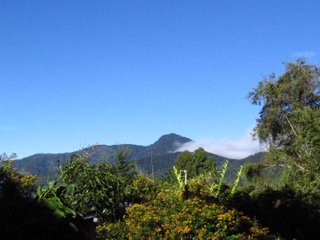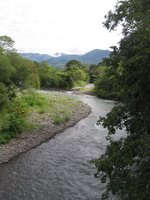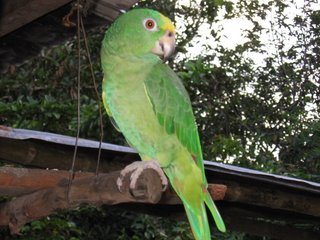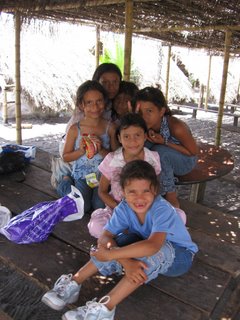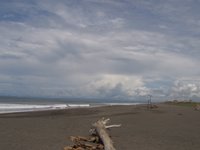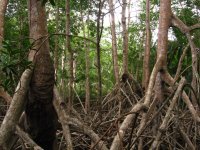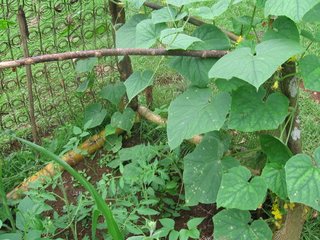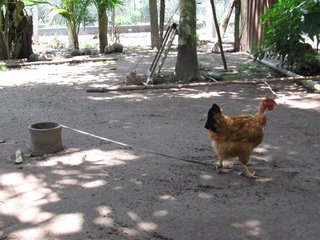
***I wrote this sitting in a yeye cafè, chuckling to myself as two
gringas behind me ordered the same spinach quiche and cappucino as I had just polished off with pleasure. In the States, I love my imported mangos, coffee and wine.***
My host father in Santa Clara works six long days a week at a chicken factory outside of Panama City. ¨Chicken¨was the one English word my host brothers knew upon my arrival. Over a simple, tasty lunch of
pollo y vegetales one day, my host mother casually remarked that even though Panama has a fairly large commercial chicken production business, the choice cutlets get sent to the United States. I hadn´t known the US imported chicken; I assumed most was ´grown´in the States, since driving by the smelly Midwestern chicken farms in my youth. Actually, Panama exports about
$433 million of goods to the US yearly, neary one half of its total exports. The relationship of the US with Panama is an ongoing pirate´s tale of invasion, politcal unrest, and the search for true freedom.
During the free trade negotiations at the beginning of 2006, the agricultural minister of Panama resigned, citing worries about more lax health standards on US imports (
1). Whether this is true or not remains negotiable, yet represents just one of the many high-pressure negotiations between the two countries. Exports of goods from Panama to the US began in the early 1900s with the conception of the
United Fruit Company, a US-based banana plantation, located on Isla Colòn in Bocas del Toro. The successful construction of the
Panama Canal under the supervision of President T. Roosevelt further complicated political relations between the two countries, ending in a treaty that handed over full control of the Canal to Panama in 1999 . Tensions reached a pinnacle during Operation Just Cause and the removal of
Manuel Noriega in the 1980s, when the US invasion resulted in a greatly disputed number of civilian deaths (300-4,000).
Currently, the gorgeous country of Panama drips with alluring economic potential. Panama faces global pressure to expand the Canal, an issue the country will vote on in an October referendum. Advertisements blatantly insist the economic benefits of this
expensive investment, backed by President Martin Torrijos. If managed with care, this project could be a boon to the economy, and even the environment, if measures are taken to carefully analyze the impact and allocate funds to environmental restoration as necessary (
2). The tourism industry is growing exponentially, propelled by a flood of US retirees (
3). I have already met quite a few of these friendly
norteamericanos, many who live in the nearby mountain town of Boquete, and a small group who settled on my beach,
La Barqueta. Finally, the US-based company
Occidental Petroleum seeks to plant a new refinery on a portion of Puerto Armuelles, at the end of the peninsula that stretches into the Pacific near the Costa Rican border.
As development increases in Panama, the job markets change. Large-scale projects such as those mentioned above employ thousands in construction and tourism-based jobs. Many Panamanians are moving to urban areas to take advantage of the booming markets. However, as half of the country prospers, the other sinks deeper into poverty. Panama has the second-highest income disparity in Latin America, behind Brazil, with 37% of its residents living below the poverty line (
2). If a current proposal to dam the Indio river for the expansion of the Panama Canal goes through, an estimated 3500
campesinos will be forced to give up their land (
2). Advocates of the expansion rebut that the project will employ many thousands of Panamanians.
However, taking away the land for many of these poor farmers is stealing their right to choose the life they want to live. Others are forced into poverty by competition from larger (often foreign) coorporations and sell their land at a cheap price, only to return months later, broke and begging for a job from the same hotel/restuarant/spa owners that previously bought their land. The oil refinery at Puerto Armuelles will undoubtably boost the economy of the region (much more so the economy of the company), but at the price of the environment and the health of those who live nearby.
Yesterday, I sat in the back of a press conference about the proposal of the new US-owned refinery, held by a group of envioronmentalists from the Chiriquí region. I watched as slides from places in the US were shown as examples of what
not to do when managing an oil refinery. A woman gave a passionate speech that brought tears to my eyes about the lack of sustainable options for the poor in the area of the proposed refinery. I have expressed discontent in the past, but for the first time in my life, I was
ashamed of my country. A slide flashed by displaying the worldwide impact of air pollution from the US, a red cloud of toxins spreading over the northern hemisphere. I thought of the rejection of the Kyoto protocol and hunkered down further in my seat, avoiding the eyes of any cameras that may pass. I do not feel responsible for companies such as these, but as a
norteamericano, I cannot remove myself from the masses, the consumerism that propels these companies to exist in the first place.
The fact is, I am not outright opposed to all large corporations and international development. There are many businesses who due their share to improve technology to be more environmentally friendly, and many rich who dedicate their lives to
courageous projects. I am opposed to greed that preys off of the resources of other countries without giving back a fair share. In terms of percentage of GNP, the US falls short of all industrialized countries in terms of foreign aid, only recently moving up from last place by one (
4). This is embarrassing. I am against those who blatantly take advantage of the world´s poor and the environment in developing countries where the infrastructure is not developed enough to stop such activities (and are sometimes blatantly encouraged). Panama´s tropical lushness is a fragile environment of intricately intwined ecosystems that daily are being destroyed. G
anadores clear rainforests to produce meat for the world´s fast food hamburger cravings, hotels spring up and erode away pristine beaches, and imports of goods wrapped in plastic fill the streets and air with their harmful biproducts, in a country with no infrastructure for garbage removal or recycling. The fact that many of these unsustainable practices are being done by Americans makes me immeasurably sad...and ashamed.
Living in this beautiful environment is a privilege I cannot possibly take for granted. I feel a huge amount of responsibility being an
extranjero from the States. I wish to change the image of our country to one that encourages sustainable development, rather than being labeled as coming from a country that siphons the best of the world´s resources into its own bottomless pit of greed. Of course I can´t do this on my own. Build gardens on your city rooftops, buy locally grown organic produce, make an effort to use less gasoline, and
por favor, don´t buy McDonald´s hamburgers. That´s all.
 Rake, rake, rake is what I do in my yard. Clean yards being along the lines of importance of religion and food in my town, I do the minimum amount of work required to maintain a sense of decency in my community. The big mango tree is currently my enemy; I must wait 3-4 months for it to hechar las frutas and then maybe we can call a truce.
Rake, rake, rake is what I do in my yard. Clean yards being along the lines of importance of religion and food in my town, I do the minimum amount of work required to maintain a sense of decency in my community. The big mango tree is currently my enemy; I must wait 3-4 months for it to hechar las frutas and then maybe we can call a truce.

